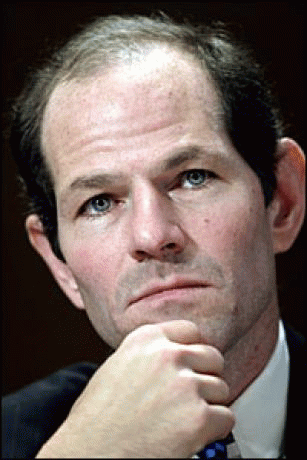At a scheduled press conference on March 12, 2008, a nervous New York Governor, Eliot Spitzer, with wife Silda by his side, told the world something they had already known for days. He was going to resign the office of Governor of New York, effective Monday, March 17, 2008. His replacement, Lt. Gov. David Paterson, a fellow Democrat, became New York's first black governor and the nation's first legally blind chief state executive.
But not everyone was dismayed by this sudden turn of events. According to an article in MSNBC, dated March 12, 2008, “Spitzer is quoted as saying, ‘I cannot allow my private failings to disrupt the people's work,’ Spitzer said Wednesday, his weary-looking wife again at his side. Yet, at the same time Spitzer's dizzying downfall was met with glee among many on Wall Street, where he was seen as a sanctimonious bully for attacking big salaries and abusive practices in the financial industry when he was New York attorney general. And his resignation brought relief at the state Capitol in Albany after days of excruciating tension and uncertainty.”[1]
Their glee was very understandable. Ever since Mr. Spitzer was elected as the New York State Attorney General in 1998, he approached his responsibility with great zeal and his specialty was white collar crime, especially the kind that can occur on Wall Street, at mortgage companies and between financial institutions. He soon earned the nickname, "the Enforcer" or "Sheriff of Wall Street."
From the very beginning even, Spitzer aimed high and one of his first victims was Merril Lynch. Time Magazine’s article from December 30, 2002, entitled Wall Street’s Top Cop, states, “[it was in] early 2002, when Eric Dinallo, Spitzer's top aide on the project, came into his office and showed him a blue binder full of e-mail he had compiled that suggested Merrill's analysts had downgraded an Internet company, GoTo.com because it hadn't given Merrill its investment-banking business. Spitzer scanned the pages and realized that, with this e-mail, Dinallo was hitting pay dirt. ‘Get them all,’ he said.”[2] The final out-of-court settlement was said to have been $100 million. But Merril Lynch was only one of many Sptizer targets during his career in the Attorney Generals’ office, both city-wide and state wide.
Eliot Spitzer’s rise to nation-wide notoriety came in February, 1992, when he successfully tried two sons of famed mafioso Carlo Gambino, Thomas and Joseph Gambino, for extortion in the New York garment district trucking industry. They had been charging a “mob tax” for all shipments which added up to 7 percent to the price of finished garments. Their plea agreement spared them incarceration, but forced them out of that trucking industry and cost them $12 million.[3]
Mr. Spitzer’s zeal to go after heavyweights steadily increased thereafter. As Attorney General, Eliot Spitzer went after major polluters in the Midwest who was sending their pollution to NYC via air currents. He won and the polluters were forced to pay $2.6 billion and clean up 18 different power plants. Tyco's Dennis Kozlowski was charged with 31 counts of felony, Enron's Andrew Fastow was indicted for wire fraud, money laundering and conspiracy, and ImClone's Sam Waksal was accused of insider trading, just to name a few.2 Where the Bush Administration turned a blind eye to illegal activity and the SEC refused to investigate, Eliot Spitzer and his team rode their horses of justice into town in an aggressive style reminiscent of another Eliot from bygone times, famed FBI agent Eliot Ness.
Mr. Spitzer’s reputation as a no-holds barred, hard-hitting AG grew steadily in the eyes of the public. His investigations, along with his record of convictions or plea-bargain settlements, infuriated his enemies as much as it enthralled his admirers. Traders, bankers and finance institutions cringed at the mere mention of his name. When he threw his hat into the ring for New York Governor, he was fully expected to continue his one-man justice band for the common man to even greater results. Certainly, Eliot Spitzer the New York Attorney General would only grow in force in his new post as Governor of New York.
And on February 14, 2008, Spitzer answered his admirer’s clarion call for justice as he fired a shot across the bow of his biggest prey yet. In fact, it doesn’t get any bigger than this. In a Washington Post article entitled, Predatory Lenders' Partner in Crime, Eliot Spitzer took on none other than the President of the United States, George Bush, and his administration.
In his article he describes how the Bush Administration stopped the states from stepping in to help consumers. He wrote, “Several years ago, state attorneys general and others involved in consumer protection began to notice a marked increase in a range of predatory lending practices by mortgage lenders. Some were misrepresenting the terms of loans, making loans without regard to consumers' ability to repay, making loans with deceptive "teaser" rates that later ballooned astronomically, packing loans with undisclosed charges and fees, or even paying illegal kickbacks. These and other practices, we noticed, were having a devastating effect on home buyers. In addition, the widespread nature of these practices, if left unchecked, threatened our financial markets.”[4]
He explained in detail how, as Attorney General for the State of New York he, and the other 49 Attorney Generals across the US, brought litigation and other means to curb these unscrupulous activities. It was their sworn duty to protect the citizens of their respective states from illegal predatory practices and since the federal government seemed reluctant to pursue this practice, the state Attorney Generals had no choice but to intervene.
And what was the federal administration’s response? The Bush Administration used an obscure area of the federal government, the Office of the Comptroller of the Currency (OCC), to block their investigation via the 1863 National Bank Act which formally preempted all state predatory lending laws. The Office of the Comptroller of the Currency (OCC) was set up originally during the American Civil War to ensure that the books of all national banks were balanced, a vital role to perform for society, but this time they were being used to thwart the very justice system they were designed to help.
Eliot Spitzer also illustrated how the Attorney Generals of all fifty states were hindered in their attempts to stop the predatory financial practices being allowed to roam free under the Bush Administration. At every turn the OCC would file counter measures to tie up any litigation brought forth by them. The Bush Administration was going to ensure that these disastrous loan practices would continue unabated while Bush was in office.
Eliot Spitzer concludes his article thus, “When history tells the story of the subprime lending crisis and recounts its devastating effects on the lives of so many innocent homeowners, the Bush administration will not be judged favorably. The tale is still unfolding, but when the dust settles, it will be judged as a willing accomplice to the lenders who went to any lengths in their quest for profits. So willing, in fact, that it used the power of the federal government in an unprecedented assault on state legislatures, as well as on state attorneys general and anyone else on the side of consumers.”4
Within a month after that article was published, Eliot Spitzer would resign as Governor of New York under a hailstorm of money laundering and prostitution accusations. The predatory lending accusations against the banks all but disappeared and, seeing how quickly even a beloved stalwart figure in society can be completely destroyed by going against the Bush administration, no one else dared pick up the mantle. The banks were free to continue their lending practices with almost no opposition.
(Note: You can view every article as one long page if you sign up as an Advocate Member, or higher).






